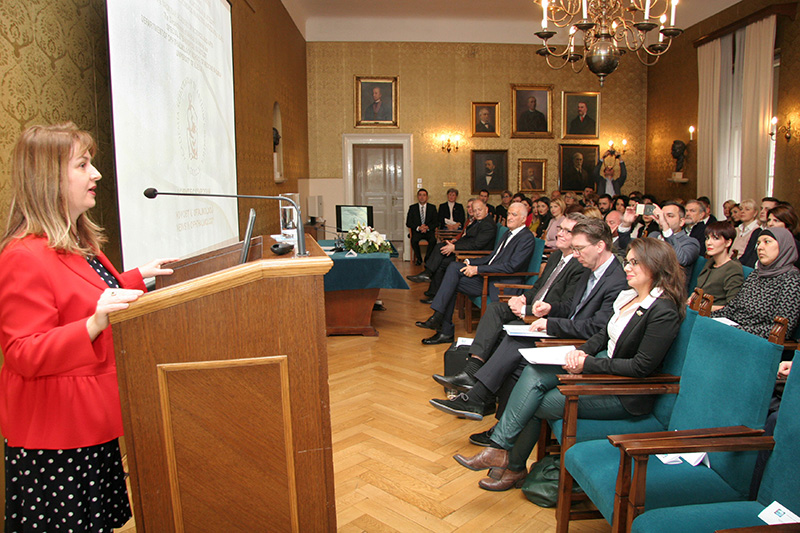The symposium featured the latest advances and scientific knowledge in the field of ophthalmology and the treatment of all segments of the eye, including the anterior and posterior segment, as well as the eye treatment in children.
Zagreb, 1 December 2017 - An international scientific symposium entitled "News in ophthalmology" was held in the palace of the Croatian Academy of Sciences and Arts, in cooperation with the Department of Medical Sciences of the Croatian Academy of Sciences and Arts and the Special Eye Hospital "Svjetlost". The symposium featured the latest advances and scientific knowledge in the field of ophthalmology and the treatment of all segments of the eye, including the anterior and posterior segment, as well as the eye treatment in children."Despite the many challenges it faces, medicine is still one of the most organized systems in the Croatian society, with ophthalmology being at the very top of that field," said the President of the Academy Prof. Zvonko Kusić at the opening of the symposium. "Conferences such as this one, co-hosted with the Eye Clinic Svjetlost for the fourth time, during which eminent national and international experts are able to present the latest achievements employed in practice, are the proof of this," added Mr. Kusić.
In the last decade, significant improvements have been made in the treatment options for eye diseases, in the scope of the traditional approach as well as that of modern eye surgery. This has greatly contributed to the advancement of eye surgery technologies and the invention of new drugs for the treatment of thus far incurable diseases. "All of these positive changes were made possible by tireless scientific research, the results of which enabled the creation new drugs and new technologies," said the President of the Organizing Committee and Medical Director of the Clinic Svjetlost Prof. Iva Dekaris.
Prof. Jesper Hjortdal from the University of Aarhus, specializing in diseases affecting the anterior segment of the eye, presented the latest corneal transplantation techniques, which enable the transplantation of a single part or layer of the eye and thus represent a much better option for patients, as these methods restore vision more quickly and increase the chances for a successful surgery outcome.
Prof. Thomas Fuschsluger, Vice-President of the European Association for Vision and Eye Research, presented a gene therapy, which is considered to be the future of ophthalmology, and demonstrated how in vitro genetic manipulation may be used in the treatment of some diseases of the cornea, that is the front transparent part of the eye.
Immunologist Carolina Arancibia from the University of Oxford addressed the research of new drugs aimed at the prevention of the rejection of transplanted tissue. Prof. Dekaris presented a corneal stem cell transplantation method which has recently entered medical practice in several European countries, including Croatia, while Dr. Tominac Trcin talked about the cultivation of stem cells in the Tissue Bank of the University Hospital Center "Sestre Milosrdnice".
The second part of the symposium included 17 lecturers from Croatian and other Southeast European presenters, who discussed their experiences in the treatment of eye diseases, the application of the latest intraocular lenses which enable vision correction and cataract removal, as well as medication for diabetic retinopathy, i.e. the posterior part of the eye, and new drugs for the treatment of macular degeneration. The latter is a disease that affects people aged 65 years or over and is frequently responsible for vision deterioration in the elderly population. There is currently about a dozen new drugs available for the treatment of this disease, said Prof. Dekaris, adding that the six existing macular degeneration medicines available in Croatian public hospitals are currently only used in one, primarily because such drugs are relatively expensive. Other novelties presented at the symposium included new biological "glues" for the treatment of damaged cornea, the role of laser vision correction of irregular cornea, the use of DNA analysis in the diagnosis of certain eye diseases, and the treatment of nystagmus, amblyopia, and other eye diseases in children.
A lecture on the business development models in the field of ophthalmology in Southeast Europe was held by prof. Nikica Gabrić, founder and director of the only Croatian ophthalmic chain that operates outside of Croatia. "The private ophthalmologists in Croatia have a combined annual turnover of around 100 million kunas, and the market in this part of Europe is slowly being penetrated by international chains, some of which have an annual turnover of over 200 million euros. As their expansion is financed by equity funds, our future lies in the formation of mutual associations and partnerships, along with greater investment in education and technology," added prof. Gabrić.
The symposium was attended by over 150 ophthalmologists from 8 European countries.



